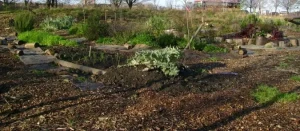SEARCH RESULTS > ARTICLES > Interaction
In the quiet depths of garden soil, a hidden symphony unfolds as plants engage in intricate relationships with microorganisms. Beyond the visible blooms and verdant foliage lies a complex network of interactions that profoundly shape the health and fertility of the soil. In this exploration, we delve into the nuanced world of plant-microbe relationships and their transformative impact on garden soil. Learn More
In the realm of sustainable living, permaculture has emerged as a guiding philosophy that transcends mere gardening. It is a holistic approach that encompasses ecological design, regenerative agriculture, and a harmonious coexistence with nature. In this article, we will delve into the essence of permaculture principles, exploring how they can be applied to create thriving and sustainable gardens. More importantly, we'll uncover the joy and fun that permaculture brings to the world of cultivation. Learn More
Attracting more animals to your garden can be a rewarding and enjoyable experience for several reasons. Wildlife can contribute to a healthy and thriving ecosystem in your garden, help with pest control, and provide opportunities for learning and appreciation of nature. Here are some steps to attract more animals to your garden and why it's beneficial. Learn More
Permaculture is a holistic and sustainable approach to designing and managing human settlements, agriculture, and ecosystems. The term "permaculture" is derived from "permanent agriculture" and "permanent culture," reflecting its core principles of sustainability and harmonious living with nature. In this introduction, we'll explore the fundamental principles and practices of permaculture, emphasizing its potential to create resilient and regenerative systems for the benefit of both people and the planet. Learn More
People have various reasons for wanting to have a garden, as it offers a range of physical, emotional, and practical benefits. Here are some insights into why people are drawn to gardening Learn More




